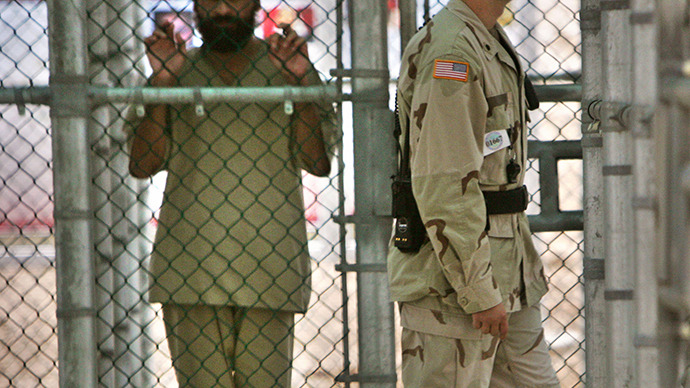Gitmo prisoner: ‘I will not eat until they restore my dignity’

One of the more than 40 Guantanamo Bay prisoners participating in a hunger strike to protest their ongoing detainment condemns the United States in a blistering editorial published this week.
Samir Naji al Hasan Moqbel says he has lost around one-fifth of his bodyweight since he began refusing meals on February 10, and reports that other inmates at the notorious Guantanamo Bay military camp in Cuba have shrank to practically half his size.
“I will not eat until they restore my dignity,” 35-year-old Moqbel tells an Arabic interpreter for an op-ed published on Sunday in the New York Times.
Dozens of inmates at Guantanamo Bay have refused to eat since earlier this year, citing rampant mistreatment and seemingly endless imprisonment as the reason for their protest.
“It’s really an abominable humanitarian situation where you’re depriving these people of life and liberty and for no really valid basis,” detainee lawyer Eric Montalvo previously told RT.
Moqbel, a Yemeni national, was picked up by Pakistani police just weeks after the September 11, 2001 terrorist attacks and transferred to Gitmo shortly thereafter. He has now been locked up there for over 11 years without charge and admits that he is likely to stay there until he’s dead.
“The only reason I am still here is that President Obama refuses to send any detainees back to Yemen. This makes no sense. I am a human being, not a passport, and I deserve to be treated like one,” he says.
In 2011, the official magazine for the US Council on Foreign Relations published a profile of the prison in which the author acknowledged, “The only guaranteed route out of Guantánamo these days for a detainee, it seems, is in a body bag.” Practically two years later, Moqbel and his fellow inmates say that the situation remains the same.
“I do not want to die here, but until President Obama and Yemen’s president do something, that is what I risk every day,” he says.
The United States Department of Defense has called Moqbel a member of al-Qaeda and a one-time bodyguard for the military group’s former leader Osama bin Laden, but the prisoner — who is likely alive only because he’s being force-fed by physicians — denies these claims. According to the inmate, he made the move to Afghanistan in 2000 in order to seek factory work and retreated only a year later amid the start of a war that remains in action over a decade later.
“After the American invasion in 2001, I fled to Pakistan like everyone else. The Pakistanis arrested me when I asked to see someone from the Yemeni Embassy. I was then sent to Kandahar, and put on the first plane to Gitmo,” he recalls to lawyers at the legal charity Reprieve through a recent unclassified telephone call.
“I could have been home years ago — no one seriously thinks I am a threat — but still I am here,” he says.
According to a secret 2008 dossier on Moqbel drafted by the Pentagon and obtained and published by WikiLeaks, the detainee’s name has been found on al-Qaeda documents, and he allegedly admitted during at least one of the interrogation sessions that he has been subjected to regularly for over a decade to taking up arms with the group. But in that same detainee assessment released by the whistleblower site, DoD officials say Moqbel poses a low threat to prison personnel and is of only medium intelligence value.
The Pentagon says Moqbel is a high risk detainee, “as he is likely to pose a threat to the US, its interests and allies.”
“Years ago the military said I was a ‘guard’ for Osama bin Laden, but this was nonsense, like something out of the American movies I used to watch. They don’t even seem to believe it anymore. But they don’t seem to care how long I sit here, either,” he says to his attorneys.
Moqbel calls the situation he and dozens of other inmates face “desperate” and insists that “all of the detainees here are suffering deeply.”
“People are fainting with exhaustion every day. I have vomited blood,” he says. “And there is no end in sight to our imprisonment. Denying ourselves food and risking death every day is the choice we have made.”
But as Moqbel refuses food in hope that his action will help expedite his exit from Gitmo — dead or alive — he says prison guards are doing everything possible to ensure inmates are kept from killing themselves through emaciation. During one recent incident, he recalls, eight military police officers in riot gear stormed into his bunk inside a prison hospital and then held him against his will for over a day straight, forcing him to eat with the aid of machines.
“They tied my hands and feet to the bed. They forcibly inserted an IV into my hand. I spent 26 hours in this state, tied to the bed. During this time I was not permitted to go to the toilet. They inserted a catheter, which was painful, degrading and unnecessary. I was not even permitted to pray,” he says.
“I had never experienced such pain before. I would not wish this cruel punishment upon anyone.”
Moqbel says he is still being force-fed twice a day, each time while his arms, legs and head are strapped to a chair. “I never know when they will come. Sometimes they come during the night, as late as 11 pm, when I’m sleeping.”
“I just hope that because of the pain we are suffering, the eyes of the world will once again look to Guantánamo before it is too late,” he concludes the editorial.
Moqbel celebrated his 11 year anniversary at Guantanamo in January.














